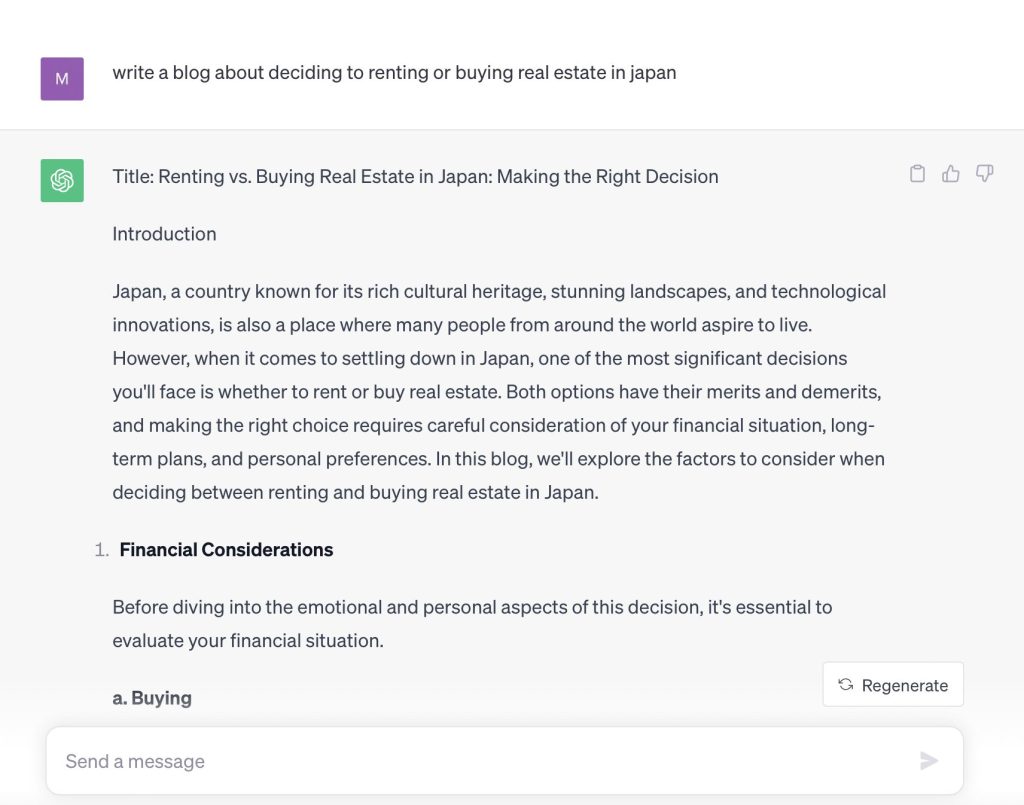
Japan, a country known for its rich cultural heritage, stunning landscapes, and technological innovations, is also a place where many people from around the world aspire to live. However, when it comes to settling down in Japan, one of the most significant decisions you’ll face is whether to rent or buy real estate. Both options have their merits and demerits, and making the right choice requires careful consideration of your financial situation, long-term plans, and personal preferences. In this blog, we’ll explore the factors to consider when deciding between renting and buying real estate in Japan.
Financial Considerations
Before diving into the emotional and personal aspects of this decision, it’s essential to evaluate your financial situation.
a. Buying
- Initial Costs: Buying real estate in Japan often comes with significant upfront costs, including a real estate agent’s fee, property transfer tax, and registration fees.
- Mortgage vs. Rent: Calculate whether a mortgage payment is feasible for you. Keep in mind that interest rates, down payments, and the length of your loan can greatly impact your monthly payments.
b. Renting
- Initial Costs: Renting typically requires a security deposit (usually one or two months’ rent) and key money (non-refundable gift to the landlord).
- Monthly Expenses: Monthly rent can vary depending on location and the type of property. Be sure to assess your budget and how it aligns with the rental market in your chosen area.
Long-Term Plans
Consider your long-term goals when deciding whether to rent or buy.
a. Buying
- Equity Buildup: Owning property allows you to build equity over time, which can be an attractive investment.
- Stability: If you plan to stay in Japan for an extended period, buying may offer more stability.
b. Renting
- Flexibility: Renting provides flexibility to move, travel, or change residences more easily.
- No Property Maintenance: You won’t be responsible for costly property maintenance, repairs, or renovations.
Location and Lifestyle
a. Buying
- Customization: Buying allows you to personalize your living space and make long-term improvements.
- Community: If you want to become part of a specific community or neighborhood, buying a property can help you establish stronger roots.
b. Renting
- Mobility: Renting is ideal if you prefer the freedom to explore different areas of Japan without being tied to a specific location.
- Low Commitment: Renting offers a low-commitment way to live in Japan, making it suitable for expats or those unsure of their long-term plans.
Market Conditions
a. Buying
- Market Stability: A stable or rising real estate market can make buying an attractive option for investment.
- Interest Rates: Keep an eye on interest rates, as they can significantly impact your monthly mortgage payments.
b. Renting
- Market Trends: If property prices are rising rapidly, renting may be a more cost-effective short-term solution.
- Market Conditions: Rental markets vary by location, so research to find areas with competitive rental prices.
Conclusion
The decision to rent or buy real estate in Japan is a significant one, and it should be based on a careful assessment of your financial situation, long-term plans, and lifestyle preferences. There is no one-size-fits-all answer, as the right choice varies from person to person. It’s advisable to consult with a local real estate expert to gain insights into the Japanese real estate market and to help you make an informed decision. Ultimately, whether you choose to rent or buy, your journey in Japan will be filled with unique experiences and opportunities to explore this beautiful country.

For additional information or any questions please contact us here
Email: info@remax-apex.com

